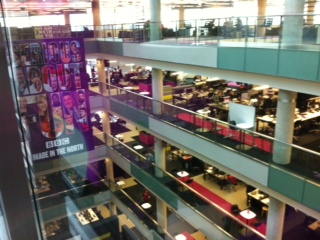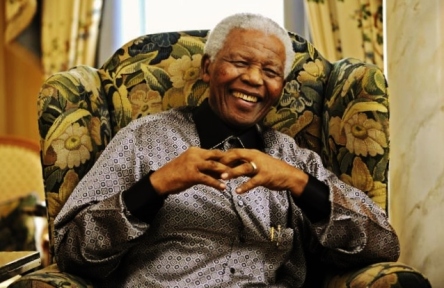For any journalist, aspiring or qualified, the opportunity to work at one of the worlds most renowned and recognised broadcasters is simply one too good to be missed. For me ambitions and aspirations of seeing the ‘beeb’ in its full glory were fulfilled on a two-week work placement earlier this month. And what an exciting and thrilling two weeks they turned out to be.
There is something simply surreal about walking into a glass-fronted office tagged with the famous BBC logo from the outside throughout to the inside of the MediaCityUK building. The complex in Salford is superbly stunning. Visually, the array of BBC and other media buildings create a modern and fresh environment. On the inside, the offices are minor in comparison to the stunning panoramic views of Salford Quays. It truly is a wonderful working environment.
Having had experience in newspaper journalism, it was an opportunity to see how television news and journalism actually works. So often, as a viewer, we take for granted the end product of a news programme, forgetting the long hours that have gone into producing a regional programme. I approached with moderate expectations – journalism is an industry where deadlines must be met and where journalists often have their own job to do. However, I was surprised at how warm and engaging some of the staff, producers and journalists alike, were in talking about their roles and offering sound advice.
Much of the fortnight placement involved research, a key component in the journalism and media jigsaw. Working with the BBC’s Sunday Politics team, it was an eye-opener to understand how much research has to take place in order for a report or programme to look and sound professional. Doing research, to some, may sound boring, yet it doesn’t have to be. Selecting and compressing opinions, ideas, facts and figures really helps understand a particular story and in turn gives the average viewer a broad sense of the story they are interacting with.
My enjoyment of simply working in an office and doing something I am passionate about made what could be a tireless and repetitive role become alive. So you would understand my overwhelming joy of shadowing some of the journalists of leading regional news programme North West Tonight. My time spent with the reporters was invaluable. Never before could I ever guess it would take up to three hours to simply film and interview for a 1 minute 45 second piece. Visiting a man who had collected one thousand music albums, an urban artist in Manchester and the cast of Peter Pan certainly gave me flavour of the lighter side of journalism, whilst input, discussion and research into stories such as fracking and ‘troubled families’ emphasised the variation in this fascinating sector.
I did begin to learn and understand some interview techniques. Simply asking questions in everyday life is evidence of probing and journalistic skills. In the modern multimedia environment, I was both surprised and un-surprised at the changing roles that journalists have to play. Surprised, I was in awe that journalists, reporters and correspondents are simply more than the question asker and the person who speaks to the camera; their roles consist of editing their pieces, choosing library footage, adding music and writing scripts, something I presumed was conducted by another member of the team. The journalist of today also plays the role of the editor and, at times, the role of the camera person. When reflecting, it wasn’t really a surprise at all. The level of new media and technology must be used and so it makes sense for editing to be done all by one multimedia, cross-platform journalist.
Work experience at the BBC is notoriously hard to get and so I was very surprised to have received a phone call from the recruitment centre. The way to succeed on any journalism placement, not just at the BBC, is to show passion and interest in the sector you are working in. Ask questions about a journalists role, speak to the producer and ask about doing specific things, such as sitting in the gallery of a live news programme. Always ask for advice on how to make a good career out of the industry, but know when to take a back seat. Engage in ordinary conversation. It could be as trivial as something about the weather or as serious as a little bit of input into a production meeting. If you are assigned a piece of research, go above and beyond what you’ve been asked, and if there is a deadline to meet, then meet it.
I talk of asking about advice and what follows is the general consensus of advice I was given by a whole host of journalists and producers.
– Work Experience. Possibly the most important factor. The more experience you have, the more shaped you are to the job and perhaps the more passionate you appear.
–Qualifications. Previously not really essential, but today journalism postgraduate courses are highly recognised by a number of universities and courses by the NCTJ. Some undergraduate courses are good, but are perhaps a little too narrow.
–Connections. Using social media and emails to connect with journalists, editors and producers. Sometimes having an email contact you can update can make all the difference.
Above all, to me, aspiration and passion is what is essential. Being persistent, determined and strong-minded is all essential not just for a career in journalism and the media, but for anything in any walk of life.

